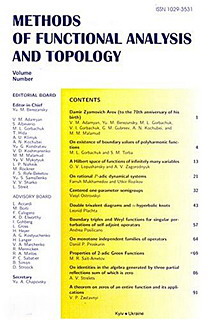L. P. Nizhnik
Search this author in Google Scholar
Scattering problem for Dirac system with nonlocal potentials
MFAT 25 (2019), no. 3, 211-218
211-218
For a Dirac system on the half-axis, we obtain an explicit expression for the scattering operator in terms of a nonlocal potential.
On the inverse eigenvalue problems for a Jacobi matrix with mixed given data
MFAT 24 (2018), no. 2, 178-186
178-186
We give necessary and sufficient conditions for existence and uniqueness of a solution to inverse eigenvalues problems for Jacobi matrix with given mixed initial data. We also propose effective algorithms for solving these problems.
On new inverse spectral problems for weighted graphs
L. P. Nizhnik, V. I. Rabanovich
MFAT 23 (2017), no. 1, 66-75
66-75
In this paper, we consider various new inverse spectral problems (ISP) for metric graphs, using maximal eigen values of the adjacency matrix of the graph and its subgraphs as well as the corresponding eigen vectors or some of their components as spectral data. We give examples of spectral data that uniquely determine the metric on the graph. Effective algorithms for solving the considered ISP are given.
Inverse spectral problems for Jacobi matrix with finite perturbed parameters
MFAT 21 (2015), no. 3, 256-265
256-265
For Jacobi matrices with finitely perturbed parameters, we get an explicit re\-presentation of the Weyl function, and solve inverse spectral problems, that is, we recover Jacobi matrices from spectral data. For the spectral data, we take the following: the spectral density of the absolutely continuous spectrum, with or without all the eigenvalues; the numerical parameters of the representation of one component of the vector-eigenfunction in terms of Chebyshev polynomials. We prove that these inverse problems have a unique solution, or only a finite number of solutions.
Spectral analysis of metric graphs with infinite rays
MFAT 20 (2014), no. 4, 391-396
391-396
We conduct a detailed analysis for finite metric graphs that have a semi-infinite chain (a ray) attached to each vertex. We show that the adjacency matrix of such a graph gives rise to a selfadjoint operator that is unitary equivalent to a direct sum of a finite number of simplest Jacobi matrices. This permitted to describe spectrums of such operators and to explicitly construct an eigenvector decomposition.
Schrödinger operators with nonlocal potentials
Sergio Albeverio, Leonid Nizhnik
MFAT 19 (2013), no. 3, 199-210
199-210
We describe selfadjoint nonlocal boundary-value conditions for new exact solvable models of Schrödinger operators with nonlocal potentials. We also solve the direct and the inverse spectral problems on a bounded line segment, as well as the scattering problem on the whole axis for first order operators with a nonlocal potential.
One-dimensional Schrödinger operators with general point interactions
MFAT 19 (2013), no. 1, 4-15
4-15
We consider various forms of boundary-value conditions for general one-dimensional Schrödinger operators with point interactions that include $\delta$-- and $\delta'$-- interactions, $\delta'$-- potential, and $\delta$-- magnetic potential. We give most simple spectral properties of such operators, and consider a possibility of finding their norm resolvent approximations.
Inverse eigenvalue problems for nonlocal Sturm-Liouville operators on a star graph
MFAT 18 (2012), no. 1, 68-78
68-78
We solve the inverse spectral problem for a class of Sturm--Liouville operators with singular nonlocal potentials and nonlocal boundary conditions on a star graph.
On generalized selfadjoint operators on scales of Hilbert spaces
Yu. M. Berezansky, J. Brasche, L. P. Nizhnik
MFAT 17 (2011), no. 3, 193-198
193-198
We consider examples of generalized selfadjoint operators that act from a positive Hilbert space to a negative space. Such operators were introduced and studied in [1]. We give examples of selfadjoint operators on the principal Hilbert space $H_ 0$ that, being considered as operators from the positive space $H_ + \subset H_ 0$ into the negative space $H_ - \supset H_ 0$, are not essentially selfadjoint in the generalized sense.
Singularly perturbed normal operators
MFAT 16 (2010), no. 4, 298-303
298-303
We give an effective description of finite rank singular perturbations of a normal operator by using the concepts we introduce of an admissible subspace and corresponding admissible operators. We give a description of rank one singular perturbations in terms of a scale of Hilbert spaces, which is constructed from the unperturbed operator.
Inverse eigenvalue problems for nonlocal Sturm-Liouville operators
MFAT 15 (2009), no. 1, 41-47
41-47
We solve the inverse spectral problem for a class of Sturm-Liouville operators with singular nonlocal potentials and nonlocal boundary conditions.
Finite rank self-adjoint perturbations
MFAT 12 (2006), no. 3, 243-253
243-253
Finite rank perturbations of a semi-bounded self-adjoint operator $A$ are studied. Different types of finite rank perturbations (regular, singular, mixed singular) are described from a unique point of view and by the same formula with the help of quasi-boundary value spaces. As an application, a Schr\"{o}dinger operator with nonlocal point interactions is considered.
Schrödinger operators with a number of negative eigenvalues equal to the number of point interactions
Sergio Albeverio, Leonid Nizhnik
MFAT 9 (2003), no. 4, 273-286
273-286
A generalized sum of the quadratic forms
MFAT 8 (2002), no. 3, 13-19
13-19
On rank one singular perturbations of selfadjoint operators
MFAT 7 (2001), no. 3, 54-66
54-66
Boundary value problems with singular conditions on boundary components of small dimensions
MFAT 7 (2001), no. 1, 76-81
76-81
Direct and inverse scattering problems for multidimensional system of first-order partial differential equations
MFAT 5 (1999), no. 2, 44-82
44-82
Representations of double commutator by matrix-differential operators
MFAT 3 (1997), no. 3, 75-80
75-80

